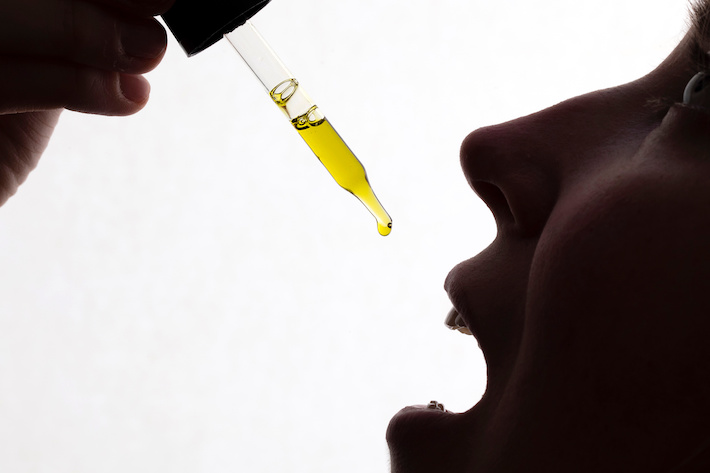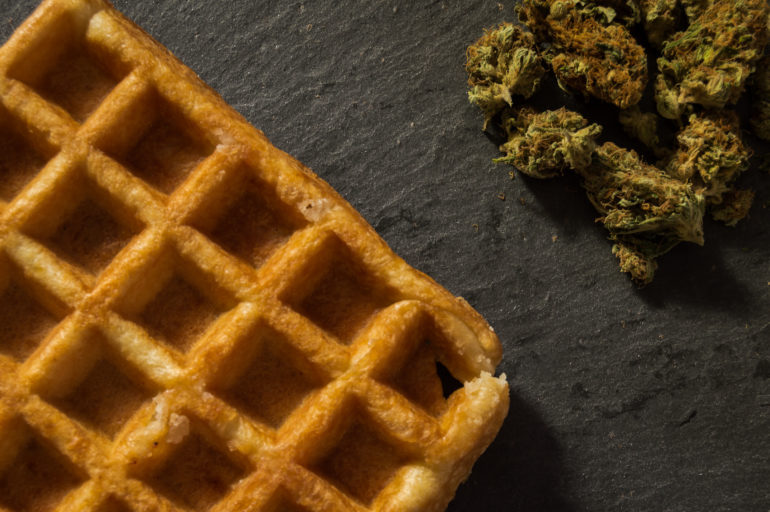No matter what, people always seem to associate the cannabis plant with the munchies. But, there are so many different cannabinoids within cannabis, and not every compound will stimulate your appetite.
With that being said, let’s address the burning question: does CBD make you hungry? If it doesn’t, would it be a good option to help with some natural weight loss? Let’s find out.
Does CBD Make You Hungry?
While you may take a hit of weed and find your stomach grumbling, you can thank the THC for that. CBD, on the other hand, doesn’t make you hungry.
Eloise Theisen, a board-certified nurse practitioner with 20 years of experience, explains, “Many people confuse the medicinal benefits of THC with CBD and appetite stimulation is one of them. While CBD on its own does not stimulate the appetite, there are some CBD products that are full spectrum and may contain enough THC to hit the right receptors and increase appetite.”
She goes on to explain that “For those who are sensitive to THC or hesitant to try it, a full spectrum CBD product is a great place to start. It is always best to go low and slow and wait at least 2 hours before repeating a dose. It is also helpful to keep a journal of how much you took, when you took, the effects you experienced, and whether you had any side effects. One thing to note, while CBD does not necessarily help with weight loss, it can suppress appetite in some people. If you are susceptible to weight loss or at risk of having a poor appetite, talk to a qualified cannabis clinician before starting a CBD product.”
As Eloise said, CBD isn’t an appetite stimulant, so you won’t find yourself craving munchies after enjoying your favorite CBD product. However, that’s not to say that CBD doesn’t work with hunger or digestion, because it definitely does. In fact, CBD plays a major role here.

When consumed, CBD works with your appetite in whatever ways your body needs. This is because the cannabinoid functions alongside the hormones in your body either stimulate or suppress appetite, depending on what you need. If you’re someone who struggles with overeating, there’s a chance that a CBD product could actually help you curb that hunger a bit.
On the flip side, others who have had trouble eating sufficiently may find that CBD can help them eat, whether it be due to lowered anxiety or boosting appetite.
Inherently, no, CBD isn’t a total appetite stimulant; however, it has shown these properties in those whose bodies need added support, as demonstrated in several studies. However, you’re not going to have your daily dose of CBD and find yourself eating a whole pizza, don’t worry.
CBD for Weight Loss: Does It Work?
On its own, CBD isn’t going to help you naturally shed pounds. However, when you consume CBD, you may experience results that make weight loss and exercise a bit easier.
For many people, weight loss is difficult because of things like chronic pain, anxiety, and even motivation.

Chronic pain can make working out extremely uncomfortable, leaving you feeling worse the days after exercising. However, CBD may be able to help. The anti-inflammatory properties of cannabidiol have been said to help tremendously with pain, especially post-workout recovery. If you consume CBD before and after exercising, it can make recovering from your workouts less painful, and the actual exercise portion more manageable. This, in turn, can help you progress further on your weight loss journey.
Along with pain, many people stray from strict exercise routines because of anxiety. Gym anxiety, specifically, can make the difference between staying at home and getting your steps in. While you don’t necessarily have to leave the house to work out, having lowered anxiety about your exercise routines can help significantly when it comes to a loss in motivation — and CBD may be able to help with that.
If you’re no longer worried about what you or others have to think about you, then tackling your weight loss journey head-on becomes that much easier.
If you’re looking for cannabinoids for weight loss, unfortunately, CBD won’t directly cause you to lose weight. But, in many ways, it could be the support your mind and body need to do the work you’ve been missing.
Does CBD Affect Your Metabolism?
Interestingly, there are various studies that support CBD affecting consumers’ metabolisms.
Back in 2016, a study was conducted to see how the cannabinoid affected brown fat within the body. Brown fat, as opposed to white fat, is said to be the “healthier” form, as it works to burn energy (and calories), meaning it’s better for your body to have higher levels of brown fat than white. Thus, the 2016 study wanted to see if CBD could convert white fat to brown fat — and it did.
The study found that CBD does work with the body to stimulate fat cell breakdown while also boosting the body’s ability to burn energy simultaneously. It also found that the cannabinoid regulated the body to slow down the production of new fat cells.
All of this has led many to believe that CBD has a direct correlation with metabolism. Again, this may not make you lose weight outright, but it can help stimulate the progress — and help — you need to start your journey off on a better foot.
CBD and Water Retention
A common question about cannabidiol consumption has to do with CBD and water retention. A lot of people want to know, “Does CBD cause bloating?” And that’s a valid question. However, there is no evidence that supports this.
It doesn’t appear as though CBD causes bloating in any way. It may cause your stomach to become upset if you consume too much, or if your body isn’t a fan of the compound; however, it’s not likely to cause you to bloat. On the flip side, the cannabinoid is actually known for helping with digestional problems such as bloating and discomfort.

Understanding CBD’s Effects on Your Appetite
With a cannabinoid as complex as CBD, there is a lot to learn about how it works and the ways it affects our appetites. In general, it’s known that CBD isn’t an appetite stimulant, so it’s not going to give you the munchies the way that THC does.
However, CBD works in your body the way that your body needs; so, if your body’s in need of more nourishment, you may find yourself being a bit hungrier after CBD. But, if you’re seeking some support with weight loss, you may find it helpful in your journey. The best way to find out? Trying some for yourself.
Last medically reviewed on August 3, 2023.
References (9)
- Argueta, D. A., Ventura, C., Kiven, S. B., Sagi, V., & Gupta, K. (2020). A balanced approach for cannabidiol use in chronic pain. Frontiers in Pharmacology, 11. https://doi.org/10.3389/fphar.2020.00561
- Atalay, S., Jarocka-Karpowicz, I., & Skrzydlewska, E. (2019b). Antioxidative and Anti-Inflammatory properties of cannabidiol. Antioxidants, 9(1), 21. https://doi.org/10.3390/antiox9010021
- Bielawiec, P., Harasim-Symbor, E., & Chabowski, A. (2020). Phytocannabinoids: useful drugs for the treatment of obesity? Special focus on cannabidiol. Frontiers in Endocrinology, 11. https://doi.org/10.3389/fendo.2020.00114
- Blessing, E., Steenkamp, M. M., Manzanares, J., & Marmar, C. R. (2015). Cannabidiol as a potential treatment for anxiety disorders. Neurotherapeutics, 12(4), 825–836. https://doi.org/10.1007/s13311-015-0387-1
- Brugnatelli, V., Turco, F., Freo, U., & Zanette, G. (2020). Irritable Bowel Syndrome: Manipulating the endocannabinoid system as First-Line treatment. Frontiers in Neuroscience, 14. https://doi.org/10.3389/fnins.2020.00371
- Fearby, N., Penman, S., & Thanos, P. K. (2022). Effects of Δ9-Tetrahydrocannibinol (THC) on obesity at different stages of life: a literature review. International Journal of Environmental Research and Public Health, 19(6), 3174. https://doi.org/10.3390/ijerph19063174
- Parray, H. A., & Yun, J. W. (2016). Cannabidiol promotes browning in 3T3-L1 adipocytes. Molecular and Cellular Biochemistry, 416(1–2), 131–139. https://doi.org/10.1007/s11010-016-2702-5
- Pinto, J. S., & Martel, F. (2022). Effects of cannabidiol on appetite and body weight: a systematic review. Clinical Drug Investigation, 42(11), 909–919. https://doi.org/10.1007/s40261-022-01205-y
- Sahinovic, A., Irwin, C., Doohan, P. T., Kevin, R. C., Cox, A. J., Lau, N. S., Desbrow, B., Johnson, N. A., Sabag, A., Hislop, M., Haber, P., McGregor, I. S., & McCartney, D. (2022). Effects of cannabidiol on exercise physiology and bioenergetics: a randomised controlled pilot trial. Sports Medicine – Open, 8(1). https://doi.org/10.1186/s40798-022-00417-y
